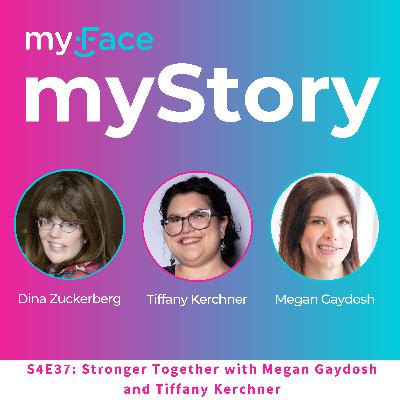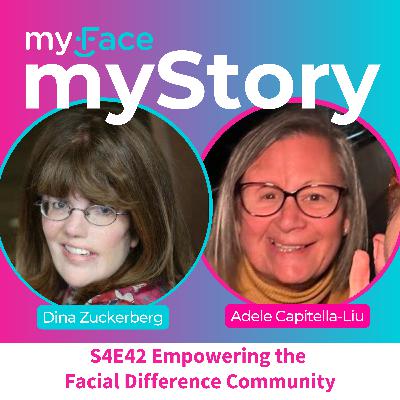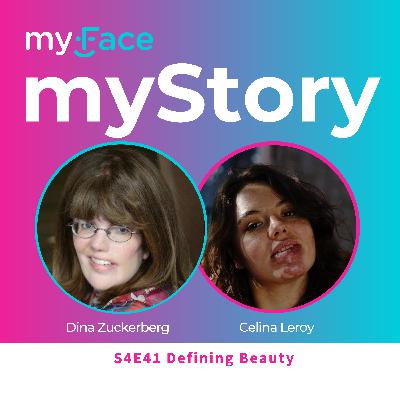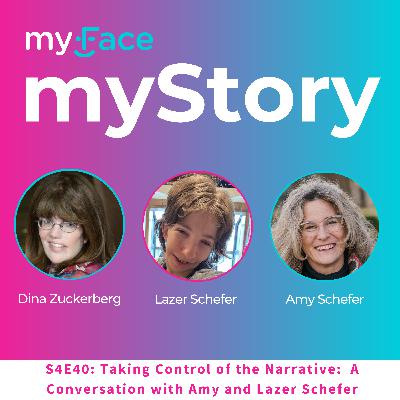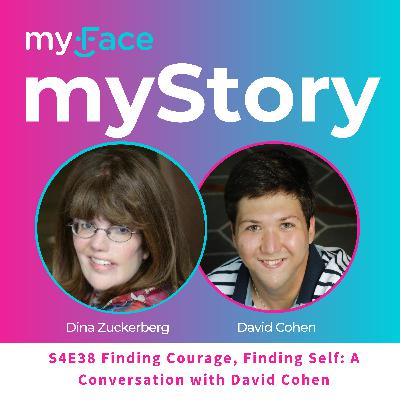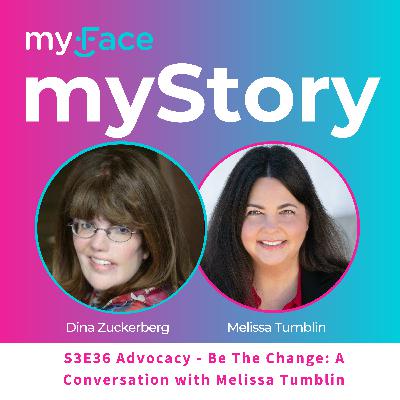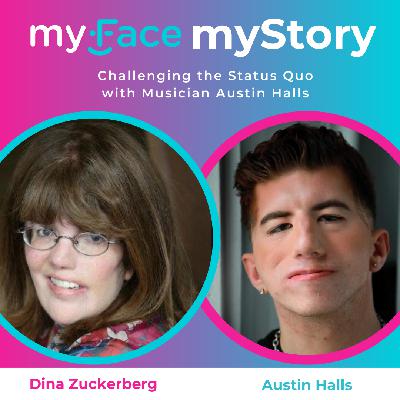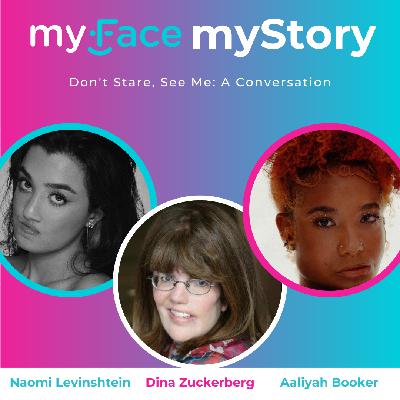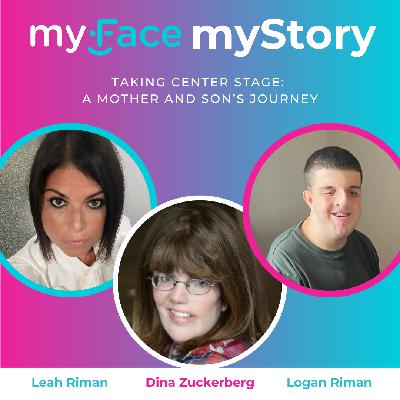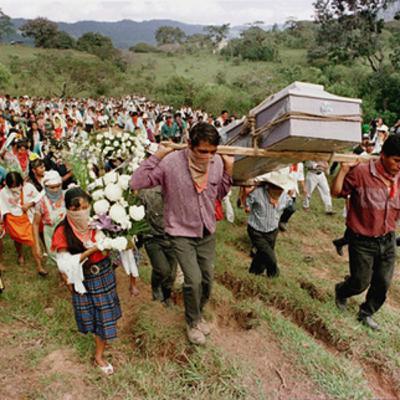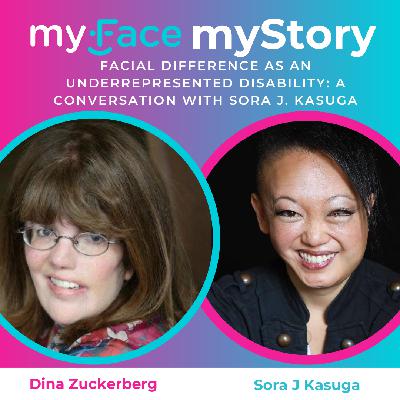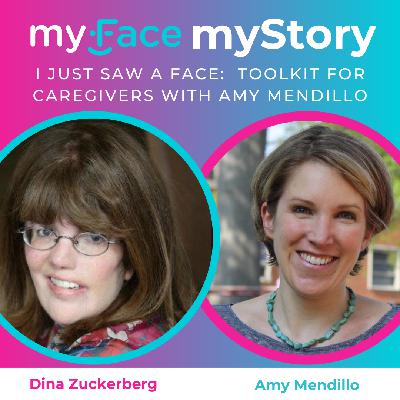Stronger Together with Megan Gaydosh and Tiffany Kerchner
Description
On this month's myFace, myStory podcast episode, host Dina Zuckerberg brings you an inspiring conversation with Megan Gaydosh and Tiffany Kerchner. Both Megan and Tiffany have turned their personal experiences with facial differences into powerful advocacy work, promoting self-love, acceptance, and awareness. Together, they discuss the importance of visibility, advocacy, and support for those with facial differences and disabilities. Their stories highlight the strength found in community and the transformative power of embracing one's uniqueness. Tune in for an insightful and uplifting episode that celebrates resilience, courage, and the belief that we are truly stronger together.
- [Announcer] Welcome to "myFace, myStory: "Voices from the craniofacial community." With your host, Dina Zuckerberg.
- Hello, and welcome to "myFace, myStory: "Voices from the craniofacial community." Whether you're watching on YouTube or listening on Apple Podcasts, click subscribe now so that you'll never miss a future episode. And if you're a fan of "myFace, myStory," rate and review the program on Apple Podcasts so that we can get a message of inclusivity and empowerment to more people. I'm your host, Dina Zuckerberg, the Director of Family Programs at myFace. I was born with a cleft lip, a hearing loss, and no vision in my left eye. "myFace, myStory" is about people like us being seen and heard, about sharing stories within the craniofacial community and with others. This podcast episode is made possible through support from the Integra Foundation, committed to improving lives. Today, I will be joined by Megan Gaydosh and Tiffany Kerchner. Megan, a former special education teacher, is now a birth doer. She loves to sing and write song parodies to inspire self-love and acceptance. She was born missing the seventh cranial nerve on her left side. While having a facial difference once held her back for pursuing her dream of becoming a singer and actress, she now confidently affirms that anything is possible and that differences only make us more of who we are. Tiffany is a nurse by day and a facial difference advocate on social media. She uses her platform to educate and spread awareness for the social injustices that her facial difference community faces every day. She was born with a rare neurological disorder called Moebius syndrome, which causes the right side of her face to be completely paralyzed. In her spare time, she enjoys reading, hanging out with her dog and cat, and tending to her houseplants. She believes it's time to break beauty standards and showcase more individual with physical differences, disabilities, and other medical complexities. Welcome, Megan and Tiffany. I really look forward to our conversation.
- Hi, so happy to be here.
- Yeah.
- Hi, thanks for having me.
- Yeah, so let's get started. Megan, can you share a bit of your personal journey of growing up with a facial difference?
- Yeah, like you said, born paralyzed on my left side, missing a facial nerve. And it was always something that I felt needed to be fixed or was always hoping for some surgery or something that would make me feel and look normal. And in my teens, I did have a two-part nerve graft surgery where I did get some more movement on my left side. But I found that even having surgeries that still was not going to look like most people, and that even having those surgeries brought more questions and comments about scars and how long is it gonna take to smile normally and just kind of added some extra layers of insecurity, actually. But I'm glad that I did it because I think I probably would have wondered what if, if not. But I think in realizing that my face is going to be different for my whole life, it felt kind of crushing in my teen years and then into my like adult years, making connections with my family and with other people with facial differences and finding that community and seeing them as so beautiful helped me be able to then see that in myself and just sort of completely reframed how I see my difference. Like now I feel like it's kind of like a superpower, like I can make a difference with my difference instead of feeling less than because of it.
- It is freeing, right? I mean, when you can just be out there and sharing who you are without needing to hide it or being uncomfortable with it. And I think it's definitely a journey. So Tiffany, I imagine you can relate some and can you share with us your personal journey?
- I feel like I should be talking about how traumatic my childhood was because there is the trauma of being hospitalized frequently. There is the trauma of the negative stigma against us and going out in public and then being bullied in school. But I was a pretty happy child despite everything. I think between the ages of two and 16, I had 13 surgeries. Despite all of that, I was still happy and I did still as happy as I was, I did have that shame about my appearance. I started growing my hair out and I started wearing it a certain way so that it wasn't as visible when I was out in public. And like Megan said, I would hope and pray like one day I'd get a phone call like, "Hey, we're gonna do the surgery "and you're gonna look like everybody else." And that day never came. And I carried that shame with me. And I think just when I started getting like more onto social media and I started seeing more people with facial differences and I'd be looking at them and I'm like, "Wow, they're so beautiful. "Like look at that woman, she's so beautiful." And then one day it clicked and it's like, "Well, if she's beautiful with a facial difference, "why can't I be beautiful with a facial difference?" And then I just started seeing my difference as this, I almost feel like it's a gift because it's made me the person I am. And it's given me this community of people. It's given me a lot.
- I always say it, right? There's power in the share story and knowing you're not alone. And when you find that community, it really does make a big difference to realize, "Wait, I'm not the only one that felt that way. "I'm not the only one that thinks this way."
- Yes.
- So Tiffany, why did you want to become a nurse?
- As I said, I spent a lot of time in hospitals, in doctor's offices. When I'd have surgery, I'd spend a couple of days up to like weeks at a time in the hospital recovering. And some of my surgeries, I would have drainage tubes coming out of my head and face area or wherever they operated on. And it would just make my hair this like matted mess and just from laying in the hospital bed. And it was the day I was being discharged and I had my nurse and her name, I still remember her name was Brittany and she was wearing a butterfly on her shirt. And I will never forget her. She came in to go over the discharge paperwork with my parents. And then she said to me, "Why don't we go take a shower "and I'm gonna fix your hair "so you can look really pretty to go home." And she washed my hair and she put my hair in braids. And I was like, wow, like she didn't have to do that. Like I know how busy her job is. I know she has more important things to do yet she took 20 minutes out of her day to make me feel good. And that really inspired me to want to do the same thing for other people.
- Megan, I know you were a special education teacher and now you are a doer. If, I don't know if it did, but did your facial difference influence your choices?
- Yes, because I really wanted to empower kids with disabilities. And it was sort of in that job where I did kind of start to make the shift of like, 'cause I would talk to my students and tell them, anything is possible. You can do anything. I would like show them slideshows of different people with disabilities who are famous. We would have these conversations of like, you can do anything that you want to do. And then I would kind of internalize that and be like, why can't I tell that to myself? 'Cause I definitely haven't done the things that I wanted to do, because I felt like that was not possible looking the way that I look, to audition for something or to put myself on stage. It was just always so terrifying. So I feel like in special education, it kind of helped me send that message to myself. And I did really, really love being a special education teacher. And then I just had my own children and found I did not have the time. I didn't feel like I could do both well or have patience for my own kids at the end of the day. And so that's kind of how I shifted to the doula role, because no matter how many babies I have, I will have baby fever. And it kind of helps me get the baby fixed. And in giving birth to myself and being postpartum, I really thought that I knew what to expect and realized I had no idea. And just wanted to help other women have an easier time through that process.
- How did your journeys lead you to become advocates now? And was there someone or something that inspired you to want to share your story and messages with others?
- Started for me on TikTok. It was about three years ago. And I was just scrolling, staying up late. And I just thought, there really is something for everybody here. I wonder if they're, I just searched facial paralysis, facial differences, and I just found multiple people in the community. And I just had this big aha moment of like, okay, these are my people, I want to join them, I want to do this too. And then yeah, the next day, I just started posting about my story. And I had posted before, but nothing about my face or my story of living with a facial difference. And yeah, finding that community kind of made it feel like a safer space, like I wasn't alone. Even if it didn't go well, I had these people in my corner. And the more I've done it, the more connections I've made. And like Tiffany, it's one of my, we call each other soul s

